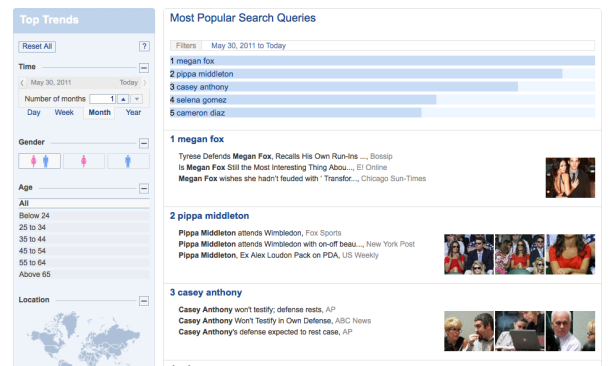Yahoo relaunches Clues trending tool, a trending service bu this users can see what other people are searching for on the Web. This tool actualy launched in the last November, the new page has been expanded beyond the previous single-page version to include information on searches executed not only in the U.S. but globally. Yahoo also added another new feature called Top Trends. This tool allows people to filter data by time periods, age, gender, place, and search category.
One of the more significant enhancements expands the amount of data users can search for from one month to a year. Also, a new map shows where the searches are originating from on both a global and local scale. My friend “Boonsri Dickinson” reviewed on this tool in news.cnet. Let’s checkout his findings bellow.
Yahoo, which touts itself has having one of the Web’s leading news sites, says it uses the data in house to make editorial decisions on which stories or trends to surface and promote on its pages.
“Yahoo Clues is already in use by Yahoo Editorial to spot and understand search trends, then translate this insight into news generation, content programming, or to share with our partners,” said Brian Theodore, director of search products at Yahoo. “In addition, the new Top Trends feature allows our users and editorial team to continuously monitor and browse for interesting or unexpected trends regionally or within a specific demographic.”
As we enter a petabyte age, search giants have been flirting with tools that give users access to the data they are processing. No doubt, Yahoo Clues will compete with Google Trends and a similar product called Google Insights for Search.
The Google Insight tool also lets users search for location specific data and narrow down the time range of the search just like the Yahoo Clues product. The Google Insights tool is more of a research tool used by advertising agencies interested in picking the right advertising messages or entrepreneurs who want to know about emerging markets, whereas the Yahoo Clues product is more focused on engaging the user on what’s hot and showing them how that search information relates to them on a global and local level.
Source
[ttjad keyword=”general”]




